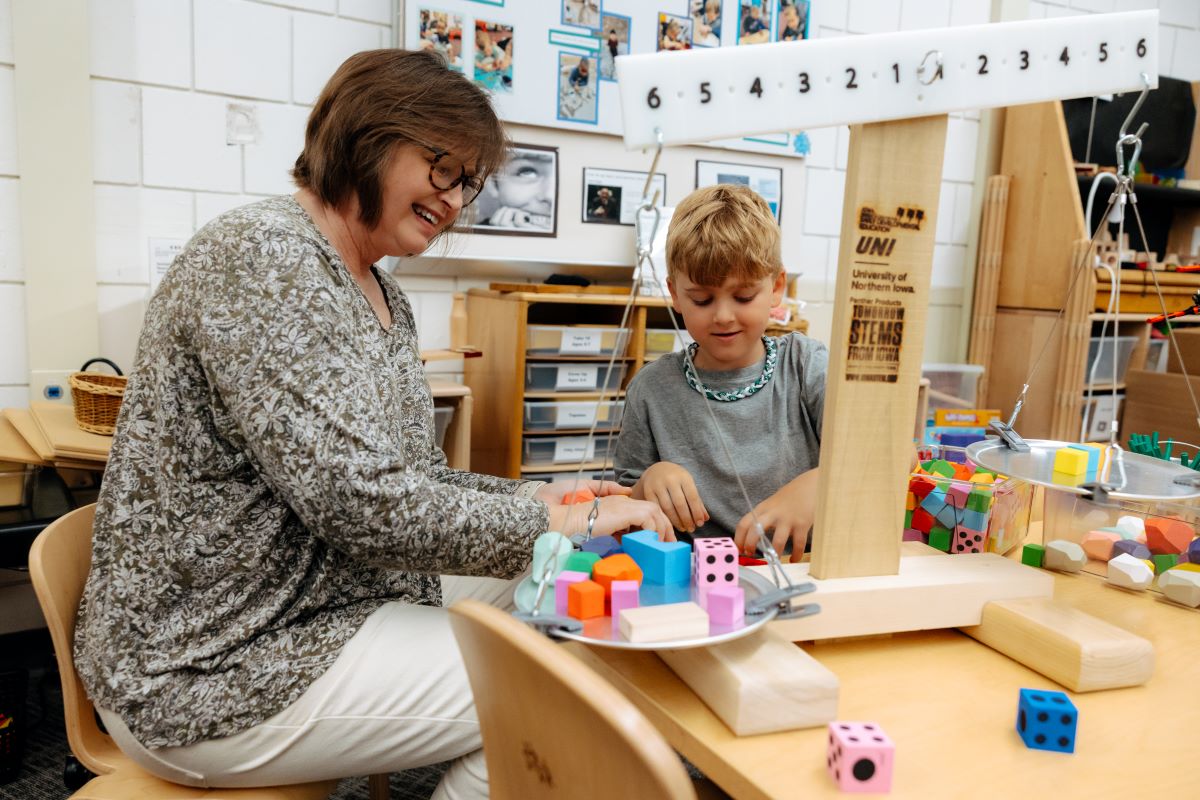'All About Balance'
Regents' Center for Early Developmental Education
A key focus for the statewide Iowa Regents’ Center for Early Developmental Education (RCEDE) is encouraging STEM in early childhood (birth through age 8) — an area often overlooked.
One way the center achieves this is through the Iowa Governor’s STEM Advisory Council’s Scale-Up program, which provides high-quality STEM education resources to PK-12 youth, both in and out of school, along with training for educators to implement them effectively.
The RCEDE, located within the College of Education, is one of several centers across the state that offers the program, having applied for and been accepted every year since 2017. Educators can visit the Scale-Up website to see all participating centers and apply to take part.
Next up for Scale-Up

Beth VanMeeteren, RCEDE director and professor in early childhood education, notes that most applicants for UNI’s program work with preschoolers. This is because from preschool through third grade, the focus is largely on literacy and math, leaving a gap in STEM education. The goal is to show preschool educators how STEM fits into their daily curriculum.
This year, RCEDE offered a program called “All About Balance,” which provides a classroom kit of materials that encourages children to explore balance, both with objects and with their own bodies.
VanMeeteren has seen the impact of these classroom kits firsthand.
“The teachers who do it say it brings the joy back to teaching for them, because just doing literacy and math year after year gets draining,” she said.
Interestingly, participating in STEM activities can also promote literacy skills. “We find that kids get so excited about what they’re figuring out that they want to write about it and learn more,” VanMeeteren says. “So there’s a reciprocity between literacy and STEM learning.”
She’s also heard from teachers that students who typically test low in literacy often excel in STEM activities — surprising both educators and students.
However, in Iowa, science is not emphasized until fourth grade. By then, VanMeeteren notes, “we’ve punched it out of them.
“Starting this from the beginning — the research agrees,” she says. “Learning STEM in middle school and high school is important, but it needs to start earlier.”
Overall, STEM helps students learn to think critically, solve problems and view the world through a new lens. This sense of curiosity is important for later educational success, particularly in the sciences.
With the Scale-Up program, educators receive a complete kit of materials, along with two days of in-person professional learning. They get to explore the materials themselves through “teacher play” and discuss best practices with experts at RCEDE.
There’s also been an exciting partnership with Panther Products, through which UNI students produce the STEM materials for the kits, further reinforcing the university’s commitment to hands-on, impactful learning experiences.
Book series promotes STEM for early learners
Educators seeking to promote STEM in early childhood can turn to a series of books that provide high-quality, research-based resources for early learning.
The series includes “Investigating Water with Young Children,” “Investigating STEM with Infants and Toddlers,” “Investigating Ramps and Pathways with Young Children,” and “Investigating Light and Shadow with Young Children,” authored by Beth VanMeeteren, and “Investigating STEM with Infants and Toddlers”, co-authored with Sherri Peterson, RCEDE program coordinator.
Published by Teachers College Press, these books offer practical, hands-on ways to integrate STEM concepts into everyday learning and are available for purchase on the RCEDE website.
